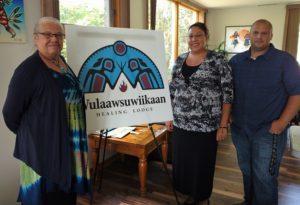Two-Spirit grandmother advocates to eliminate homophobia

By Colin Graf
MUNSEE DELAWARE NATION—It’s time to eliminate homophobia and allow Two-Spirit people to reclaim their proper place in First Nations’ culture – that’s the message given to the audience at the Wulaawsuwiikaan Healing Lodge by Theresa Sims, a Two-Spirit grandmother who is making it her mission to deliver this message across southern Ontario.
“Two-Spirit people were accepted and even honoured in the traditions of First Nations, and they should not be afraid to come out and be part of Indigenous society today,” explained Sims, the Indigenous cultural and language specialist with the Ska:Na Family Learning Centre in Windsor, ON.
She explained the concept of being Two-Spirit in that it is not the same as dominant cultural ideas of hetero-, homo-, or bi-sexuality. Two-Spirit people can “see and feel both sides”, but the idea is not all about a person’s sexuality. Two-Spirits can have any sexual orientation, she says, and the idea that these matters are only about sexual preference is not part of Indigenous culture, she explained to the group of 20 participants, including lesbian, gay, bisexual, transgender, 2-spirited, and queer community (LGBT2Q) people from area First Nations and from nearby London.
The lodge’s assistant director Lori George learned that teachings about Two-Spiritedness were badly needed in her community a few months ago. While she was working as receptionist at the centre, she spoke with a “distraught older person” for about 20-30 minutes about his struggles of coming out as a gay person.
“The person spoke about needing a space closer to home for himself, so I said ‘Let me see what I can do’,” recalled George.
Shortly after she was promoted to assistant director, George immediately started looking for ways to make the lodge an inclusive and a safe space for everyone.
“I know we have Two-Spirit in our community and in my family and I know how there is this stigma still about this, especially in our communities,” explained Goerge. “We need to start putting those fires out and re-teaching and letting them reclaim their position.”
The old ways that were inclusive of Two-Spirits are quite close for Theresa Sims, as she was born late in her mother’s life and also knew her grandmother who had lived in the 1800s.
As she grew up, Sims says her mother recognized Two-Spirits in her.
“I can see problems from both sides, and I can teach about that,” stated Sims.
She was good with her hands, often taking to mechanical tasks associated with masculinity; however, Sims’ career has been in the caring and teaching professions, working at different times as a mental health outreach worker and then as executive director of the Elizabeth Fry Society in Hamilton.
She later lived in Windsor, and while there, she worked with suicidal people, in newborn clinics, and as a literacy coordinator.
Sims is now making it her mission to bring back those old, accepting ways by presenting to various groups on Two-Spiritedness, including teachers and high school students, as well as other teachings close to her heart.
“I just tell them I am teaching them as a Two-Spirit grandma. This is how I help my family, my community, my nation and it’s reclaiming who we are,” she explained.
One young First Nations man in attendance of Sims’ teachings remembered hearing a lot of sexism and homophobia growing up, and told the group that it’s “critically important” for things to change.
A young woman said it’s wrong how the Two-Spirit identification has been “put in a box of Western ideas”.
“I am not gay, not lesbian, not bisexual, but I carry those two fires, those two teachings,” she told the group.
Jason George, program coordinator at the healing lodge, told the group he was “very homophobic” in the past, but that his eyes have “opened wide.” He hopes to encourage others “to see people and look for their spirit, not what they may look like on the outside.”
Homophobia is present in many First Nations, says Sims in an interview.
“A lot of Elders say ‘we don’t have any gay people in our community’, ‘we don’t have that in our community’—it just shows they’re not ready for these teachings,” Sims said.
In her working life, Sims remembers executive directors of friendship centres or First Nations health centres who would not even accept that there was a gay part of their community. Sims recalls that their response was “go send them to the mental health workers.”
“Homophobia in Indigenous communities is a way of putting labels on people that comes from colonialism,” says Jason George.
“That wasn’t our way, but we’ve picked it up, we live in a very fear-based society,” he added.
George emphasized that homophobic labelling is “exactly the kind of thing we are trying to heal from.”
Sims finds some of those most receptive to her teachings are urban Indigenous youth. When asked if she sees changes happening, Sims is non-committal.
“It took seven generations to get to this point, so it will take at least seven generations to help heal,” she said.
Sims’ presentation was intended for front-line workers, and “anybody who wants to come out and learn,” according to Jason George. Agencies represented at the workshop included the Oxford-Elgin Legal Clinic, the nearby Nimkee NupiGawagan Healing Centre for youth, and Atlohsa Native Family Healing Services Inc. from London.

